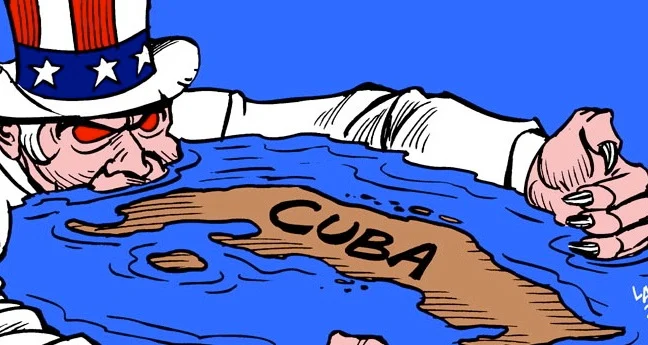An Entirely Avoidable Humanitarian Crisis—US Embargo Continues to Inflict Immense Suffering on Cuba
LATIN AMERICA AND THE CARIBBEAN, 29 Apr 2024
Bharat Dogra | Global Research - TRANSCEND Media Service
22 Apr 2024 – Cuba provides an inspiring example of a very small country whose doctors have reached some of the most difficult areas of human distress and disasters to provide their medical services to people who needed them the most. US President Barack Obama said—
“No one should deny the service that thousands of Cuban doctors have delivered for the poor suffering people.”
What is the reward that Cuba gets for this service? Often its people cannot get essential services and medical equipment. This is due to the embargo against Cuba imposed by the USA for over six decades.
In addition Cubans face problems in getting food, meeting other basic needs and trading with other countries, despite trade being integral to the development needs of this island nation. The UN Economic Commission for Latin America estimated embargo costs for Cuba at 130 billion dollars, or about 2 billion dollars per year. Other estimates mention a higher figure.
Don’t ask for any credible reasons to explain why the USA has done this because none exists. Have you ever seen a bully tormenting a small child? The bully does not have to give any reasons, he does what he is doing because he can go on doing this.
The only hopeful time for Cuba during these long decades was when President Obama removed many restrictions and initiated cooperation activities instead, giving very encouraging results. But this period lasted only for a short while, and President Trump made things worse by introducing terror sponsor charges as well against the country, without any evidence of course.
Such charges, which were first brought in during the tenure of Ronald Reagan, ignore the well-known fact that it is the Cubans who have been at the receiving end of several terror attacks launched by Cuban exiles from US territory and often with help from US sources, including the CIA. One of these attacks led to the death of 73 air travelers. Cuban hotels with tourists living there have also been attacked. There were several attacks on the Cuban President Fidel Castro to try to assassinate or harm him.
After the success of the Cuban revolution led by Castro which brought many equality and justice-based changes in Cuba, the USA embarked on a policy of disrupting Cuban government and economy. This is how the aims of US policy were summarized by Deputy Assistant Secretary of State, USA, Lester D. Mallory in 1960—
“Every possible means should be undertaken promptly to weaken the economic life of Cuba…denying money and supplies to Cuba, to decrease monetary and real wages, to bring about hunger, desperation and overthrow of government.”
When such a statement is made openly, is anything left to say regarding the glaring violation of all ethical considerations in US policies towards Cuba?
The utter lack of ethics in US embargo policy is also evident from the consistent opposition to this policy by an overwhelming majority of countries as reflected in UN General Assembly annual voting on Cuba’s resolution condemning US embargo. During the last year this was supported by 187 member countries, opposed by only two (who else but USA and Israel) with one absentee (Ukraine). Hence there is almost universal opposition to US embargo (which is called blockade by the Cuban government) and this embargo with all its extensive sanctions should be lifted immediately. This is a clear example of an entirely avoidable humanitarian crisis which can end very easily merely by a bit of enlightened decision making on the part of the US authorities.
_______________________________________________
Bharat Dogra is Honorary Convener, Campaign to Save Earth Now. His recent books include Planet in Peril, Protecting Earth for Children, A Day in 2071, and Earth without Borders.
Go to Original – globalresearch.ca
Tags: Anglo America, Cuba, Cultural violence, Embargo, Evil empire, Hegemony, Imperialism, Latin America Caribbean, Structural violence, USA
DISCLAIMER: The statements, views and opinions expressed in pieces republished here are solely those of the authors and do not necessarily represent those of TMS. In accordance with title 17 U.S.C. section 107, this material is distributed without profit to those who have expressed a prior interest in receiving the included information for research and educational purposes. TMS has no affiliation whatsoever with the originator of this article nor is TMS endorsed or sponsored by the originator. “GO TO ORIGINAL” links are provided as a convenience to our readers and allow for verification of authenticity. However, as originating pages are often updated by their originating host sites, the versions posted may not match the versions our readers view when clicking the “GO TO ORIGINAL” links. This site contains copyrighted material the use of which has not always been specifically authorized by the copyright owner. We are making such material available in our efforts to advance understanding of environmental, political, human rights, economic, democracy, scientific, and social justice issues, etc. We believe this constitutes a ‘fair use’ of any such copyrighted material as provided for in section 107 of the US Copyright Law. In accordance with Title 17 U.S.C. Section 107, the material on this site is distributed without profit to those who have expressed a prior interest in receiving the included information for research and educational purposes. For more information go to: http://www.law.cornell.edu/uscode/17/107.shtml. If you wish to use copyrighted material from this site for purposes of your own that go beyond ‘fair use’, you must obtain permission from the copyright owner.
Read more
Click here to go to the current weekly digest or pick another article:
LATIN AMERICA AND THE CARIBBEAN:
